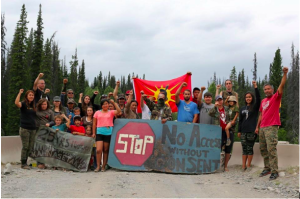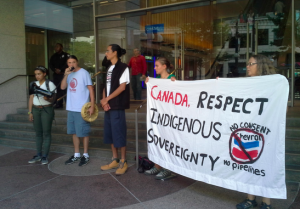This post was written by Western Washington University divestment organizer and 2015 Fossil Free Fellow Galen Herz.

A photo of indigenous leaders and supporters at the entrance to the Unist’ot’en Camp. The camp is currently blocking two Keystone XL’s worth of carbon.
What is the Unist’ot’en Camp?
At the end of a long dirt road in northern British Columbia, deep in the boreal forest, there is a bridge blocked by a large painted wooden sign, that states clearly, “Stop. No Access Without Consent”. This marks the entrance to the Unist’ot’en Camp, a resistance community that has been protecting sovereign Unist’ot’en territory.
The camp is currently blocking 11 total proposed oil and gas pipelines that would run through Unist’ot’en territory. Combined, those pipelines have a climate impact of total 272.2 million metric tons CO2e per year, or almost twice the climate impact of the Keystone XL pipeline. The climate movement should be paying attention to the Unist’ot’en Camp (and by the time you’ve finished reading this, I hope actively supporting).
The Unist’ot’en are a clan of the Wet’suwet’en nation, and have authority over sovereign land which has never been ceded to the colonial Canadian state; the Wet’suwet’en are not under treaty with the Canadian government. Their territory, therefore, is and always will be free, and belongs to the Wet’suwet’en people alone.

The gorgeous Wezdin Kwah river flowing near the camp, pure enough to drink straight from. Eleven oil and gas pipelines are proposed over this river.
Five years ago members of the Wet’suwet’en learned of proposals from oil and gas companies to build a corridor of tar sands and fracked gas pipelines through their unceded traditional territories. People of the Unist’ot’en clan began building homes in the GPS coordinates of these proposed pipelines to assert their authority over their traditional territory. The Unist’oten Camp has set up a checkpoint where they have instituted their free prior and informed consent protocol for people to access their land. In order for visitors to access Unist’ot’en territory they must answer questions about the intent of their visit and gain consent of the Unist’ot’en people.
Recent Updates and the Unist’ot’en Call for Physical Support and Solidarity

Unist’ot’en Clan Spokesperson Freda Huson talks with a Canadian police officer attempting to enter Unist’ot’en territory. A few days later, Chevron employees tried to enter the territory.
Canadian police attempted to enter the Unist’ot’en camp in the middle of July and were blocked by camp supporters. The altercation was caught on video and now has over 760,000 views on Facebook. A few days later, Chevron employees tried to enter the territory and insultingly offered a handful of tobacco and bottled water to Unist’ot’en leaders (at 2:10 in the video), which the Unist’ot’en rejected. This recent escalation from the colonial Canadian state and fossil fuel industry prompted to the Unist’ot’en to put out a call for solidarity.
Supporters were asked to hold solidarity actions targeting Chevron investors’ offices in their towns. Having been to the camp this past winter and seen the powerful decolonizing work underway, I had to answer the call to action.

Indigenous activist Matt Remle on the mic outside the Canadian Consulate.
I helped organize an action in Seattle that went to the Canadian Consulate and Fidelity Investments. The action was a success! We received excellent local press coverage, and forced the Canadian Consulate and Fidelity Investments to close for thirty minutes each. Check out the two minute video recap of the action.
My background as a divestment organizer has strengthened my ability to act in solidarity effectively. Whether it was going to the camp or targeting Fidelity, most the people I was working with I developed relationships with through divestment. The practical skills of knowing how to make banners effectively and media advisories were there because of divestment. More radical friends of mine once framed divestment organizing as a distraction from supporting the Unist’ot’en Camp. I have found the opposite, they are mutually reinforcing. It is important to target the fossil fuel industry at every level – from pipeline infrastructure to university investments.
Moving forward, the Unis’tot’en camp needs committed support in materials, resources, fundraising, awareness, and people. To join the effort, check out the call for support on their website.